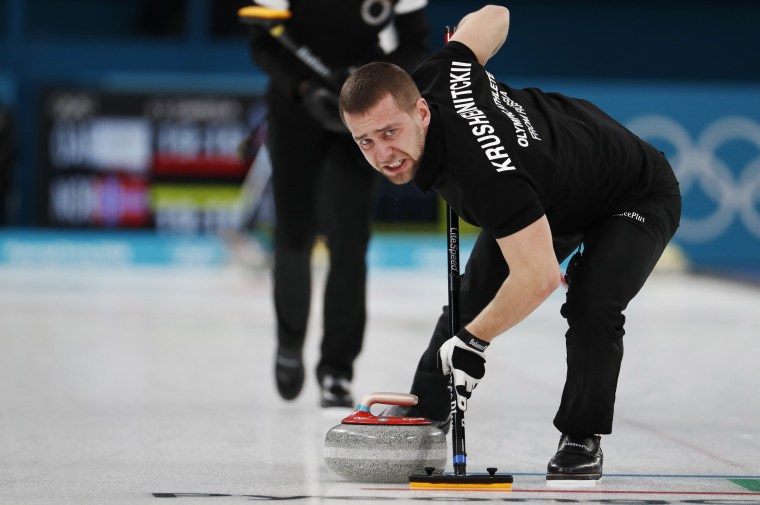GANGNEUNG, South Korea — The second test of a sample from a curler who captured a bronze medal in PyeongChang contained a banned substance, the Russian delegation said in a case threatening to taint another Winter Olympics with the specter of doping.
Alexander Krushelnitsky, 25, failed a preliminary drug test. The initial sample had shown he tested positive for meldonium, a Latvian-made heart medicine which increases blood flow and boosts stamina and has been banned since 2016.

In a statement, the delegation said the second set of results indicated Alexander Krushelnitsky only consumed meldonium once.
It added that would be "absolutely useless and ineffective" if the intent was to enhance performance. The delegation has not provided any data from the test.
The second test was on the same sample as the first. The sample is split into two bottles and tested separately to make sure lab equipment error doesn't result in a false positive.
Russian curling officials have previously suggested that Krushelnitsky could have been set up by a rival Russian athlete or Russia's political enemies. He and his wife, Anastasia Bryzgalova, were third in mixed-doubles curling.
The Court of Arbitration for Sport, or CAS, said Monday it had launched a doping procedure against Krushelnitsky, although no hearing date was set. Russia's curling federation also said it was investigating.
Krushelnitsky faces being stripped of his medal.
While curling — in which shuffleboard meets chess — is not the most high-intensity sport at the Winter Olympics, matches can last over two hours and give athletes' arms a tiring workout.
Any confirmed cases of doping by Russian athletes at these games could derail Team Russia's chances of being officially reinstated in the Olympic fold and allowing its athletes to march under the Russian flag in Sunday's closing ceremony.
The country's Olympic committee was banned after allegations of state-sponsored doping at the 2014 Winter Games in Sochi, Russia. Any Russian athletes who wanted to compete in PyeongChang had to undergo rigorous testing requirements to prove they have not used banned substances.
The nearly 170 of them here have also been forced to compete under a neutral Olympic flag and are called the Olympic Athletes from Russia, or OAR — although that hasn't stopped Russian fans from wearing the tricolors of the Russian flag and chanting pro-Russia slogans during competitions.
Russia, meanwhile, must still pay a $15 million fine levied by the International Olympic Committee against the team meant to be used toward anti-doping initiatives.
IOC spokesman Mark Adams declined to say Tuesday what would happen if Russia fails to pay.
The OAR team has been under scrutiny by Olympic officials in PyeongChang, and cases of doping would jeopardize Team Russia, which is expected to learn Saturday if it can officially fly its flag before the end of the games.
"The behavior of the team in general and other aspects will be taken into account," Adams said.
OAR is already under review after one of its speed skaters, Semen Elistratov, was vocal about his displeasure with the Russian ban and dedicated his bronze medal win "to all guys that have been excluded from these games in such a hard and unfair way."
Last week, Japanese short track speedskater Kei Saito was found to have tested positive for a chemical used to mask the presence of banned drugs and was forced to leave the Olympics under a provisional suspension.